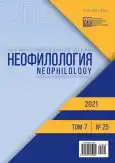Dream in Gaito Gazdanov’s prose as a literary problem
- Authors: Ivanov E.E.1, Ivanova G.P.2
-
Affiliations:
- Irkutsk state University
- Issue: Vol 7, No 25 (2021)
- Pages: 91-101
- Section: РУССКАЯ ЛИТЕРАТУРА
- URL: https://journal-vniispk.ru/2587-6953/article/view/302472
- DOI: https://doi.org/10.20310/2587-6953-2021-7-25-91-101
- ID: 302472
Cite item
Full Text
Abstract
We highlight the problem of dream in the poetics of G. Gazdanov’s prose. We consider dream from the perspective of creativity pragmatics, self-knowledge and its role in the architectonics of the text. We trace the dynamics of the development of the artistic dream representation as an intertextual phenomenon. In the light of literary associations with the works of A.S. Pushkin, F.M. Dostoevsky and E. Poe, dream in G. Gazdanov’s works is defined as the development of the mythologeme Narcissus in the interpretation of A. Gide in the homonymous essay. We analyze the convergence of the dream theme and delusiveness of the real world and the oniric divinology’s influence on the narrative as a whole. The anarrative elements of metanarrative that undermine the evidence of events are described as a system of opposing the current situation to eternity. The author’s position in the novels related to the Civil War and emigration is considered in terms of M.M. Bakhtin’s work “Toward a Philosophy of the Act”. The author’s “outsideness” to the everyday world, delimiting the inverted world of violence from culture, is manifested as “different” to the narrated world. The dream appears as the universals not only in terms of the poetics of possible fictional worlds, but also as a totality in the characters’ development. The acquisition of reality is only possible in the last writer’s works, in altruism as the “awakening” of the characters and in the intention to the state of samadhi. Nirvana as a mode of the author’s “outsideness” “descends” into the characters’ world as a result of “movement of feelings” or “spiritual fire” – the prevailing feature of G. Gazdanov’s works. Thus, the delusiveness dream as a generalizing formant of metanarrative weakens as one moves away from the “horrors of history” as a traumatic experience of participation in a war and the ensuing unsettled-“unnoticed” image of the author. The polyphonism of the voices of the author and the characters in recent novels forms a single narrative field, and here and now it acquires the status of reality as enlightenment, or, in G. Gazdanov’s thesaurus, “rebirth”.
Keywords
About the authors
E. E. Ivanov
Irkutsk state University
Email: ayaom@list.ru
ORCID iD: 0000-0002-9937-4357
Post-Graduate Student
1 Karl Marx St., Irkutsk 664003, Russian FederationG. P. Ivanova
Author for correspondence.
Email: tervhen66@mail.ru
ORCID iD: 0000-0003-4184-1597
Candidate of Philology, Associate Professor of the Russian Language Department
113 Leningradskaya St., Novosibirsk 630008, Russian FederationReferences
- Pushkin A.S. Polnoye sobraniye sochineniy: v 10 t. T. 5: Evgeniy Onegin. Dramaticheskiye proizvedeniya [Completed Works: in 10 vols. Vol. 5: Eugene Onegin. Dramatic Works]. Leningrad, Nauka Publ., 1978, 527 p. (In Russian).
- Lotman Y.M. Smert’ kak problema syuzheta [Death as a plot problem]. Studies in Slavic Literature and Poetics, Vol. 20; Literary Tradition and Practice in Russian Culture. Amsterdam, Atlanta, 1993. (In Russian).
- Pumpyanskiy L.V. Dostoyevskiy i antichnost’: [Doklad, chitannyy v Vol’noy filosofskoy assotsiatsii 2 ok-tyabrya 1921 g.] [Dostoevsky and Antiquity: [Lecture Read at the Free Philosophical Association on October 2, 1921]. Petrograd, Zamysly Publ., 1922, 48 p. (In Russian).
- Bakhtin M.M. K filosofii postupka [Towards a philosophy of the act]. Filosofiya i sotsiologiya nauki i tekhniki. Ezhegodnik 1984–1985 [Philosophy and Sociology of Science and Technology. Yearbook 1984–1985]. Mos-cow, 1986, pp. 80-160. (In Russian).
- Gazdanov G. Sobraniye sochineniy: v 5 t. [Collected Works: in 5 vols.]. Moscow, 2009. (In Russian).
- Jandl I. Textimmanente Wahrnehmung bei Gajto Gazdanov: Sinne und Emotion als Motivische und Strukturelle Schnittstelle zwischen Subjekt und Weltbild. Berlin, Peter Lang GmbH, 2019, 566 p. (In German).
- Dugin A. Imya moye – topor. Dostoyevskiy i metafizika Peterburga [My Name is an Ax. Dostoevsky and the Metaphysics of Petersburg]. 2011, 11 Nov. (In Russian). Available at: http://rossia3.ru/ideolog/nashi/dostoev (accessed 08.07.2020).
- Po E.A. Stikhotvoreniya; Novelly; Povest’ o priklyucheniyakh Artura Gordona Pima; Esse [Poems; Novels; The Narrative of Arthur Gordon Pym; Essays]. Moscow, AST, NF “Pushkin Library” Publ., 2003. (In Russian).
- Venediktova T.D. Po sledu serafimov: mezhdu poeziyey i analiticheskoy prozoy. (Chteniye «Vorona» E.A. Po) [In the seraphyms’ footfalls: between poetry and analytical prose (Reading “The Raven” by Edgar Allan Poe)]. Literatura dvukh Amerik – Literature of the Americas, 2017, no. 2, pp. 117-133. (In Russian).
- Ivanov E.E. Irrealizm v romane G. Gazdanova «Vecher u Kler» [Irrealism in the novel of G. Gazdanov “Evening at Clairs”]. FILOLOGOS [Philologos], 2019, no. 4 (43), pp. 33-41. (In Russian).
- Dostoyevskiy F.M. Sobraniye sochineniy: v 15 t. T. 15 [Collected Works: in 5 vols. Vol. 15]. Leningrad, Nauka Publ., 1996, 862 p. (In Russian).
- Kolesnikov A.S. Mirovaya filosofiya v epokhu globalizatsii [World Philosophy in the Globalization Era]. New York, St. Petersburg, Zarubezhnaya Rossiya Publ., 2008, 434 p. (In Russian).
- Bashlyar G. Izbrannoye: Poetika prostranstva [Favorites: Poetics of Space]. Moscow, Russian Political Encyc-lopedia Publ., 2004, 376 p. (In Russian).
- Zhid A. Sobraniye sochineniy: v 7 t. T. 1: Traktat o Nartsisse [Collected Works: in 7 vols. Vol. 1: Treatise on Narcissus]. Moscow, TERRA – Book Club Publ., 2002, 413 p. (In Russian).
- Ivanov E.E. Sil’nyye pozitsii teksta kak put’ «filosofii zhizni» v romane A. Pushkina «Evgeniy Onegin» [Strong positions of the text as a way of “philosophy of life” in the novel of A. Pushkin “Eugene Onegin”]. Vestnik un-iversiteta (Rossiysko-Tadzhikskiy (slavyanskiy) universitet) – Bulletin of the University (Russian-Tajik (Slavonic) University), 2019, no. 4 (68), pp. 198-211. (In Russian).
- Arutyunova N.D. Yazyk i mir cheloveka [Human Language and World]. Moscow, Languages of the Russian Culture Publ., 1998, 896 p. (In Russian).
Supplementary files









